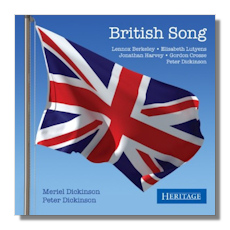
The Internet's Premier Classical Music Source
Related Links
-
Berkeley Reviews
Crosse Reviews
Dickinson Reviews
Harvey Reviews
Lutyens Reviews - Latest Reviews
- More Reviews
-
By Composer
-
Collections
DVD & Blu-ray
Books
Concert Reviews
Articles/Interviews
Software
Audio
Search Amazon
Recommended Links
Site News
 CD Review
CD Review
British Song

- Peter Dickinson:
- Surrealist Landscape, text by Lord Berners (1973)
- Extravagances, text by Gregory Corso (1963-69)
- Jonathan Harvey: Correspondances, text by Beaudelaire (1975)
- Lennox Berkeley: Chinese Songs, Op: 78 (1971)
- Gordon Crosse: The New World, text by Ted Hughes (1969)
- Elizabeth Lutyens: Stevie Smith Songs (1948-53)
Meriel Dickinson, mezzo soprano
Peter Dickinson, piano
Texts included
Heritage HTGCD240 77:45
The works here most appealing to my tastes are the first and the last: Dickinson's Surrealist Landscape and Luyten's Stevie Smith Songs, even though the styles of these pieces could not be much more different. As the notes mention, "none of the music falls into the category of the traditional English song cycle…" As can be noted above, most of the works date from the 1970s and definitely sound it, stylistically.
Lord Berners dedicated his poem "Surrealist Landscape" to Salvador Dali. Unlike the other poems set here, the words are not important, and in fact Dickinson's composition includes five vocalizes derived from Berners' nonsense song, "Red Roses and Red Noses." The piano part, which begins with satisfyingly played and very deep slow chords (on a Bösendorfer Imperial), includes some plucked strings, which somewhat resemble the sounds of a prepared piano except that the tones are clearer. There is overdubbing of the vocalizes and piano part, superimposed on the song, sparing the need for an additional piano and voice. The general effect is somewhat mysterious and can be fascinating.
At the other stylistic extreme, the very short settings of ten Stevie Smith poems are delightfully spritely, simple, and unmannered, with modest melodic intervals and cadences faithful to the poems as one might read them: somewhat like the metrics of Emily Dickinson or with echoes of other poets, and perhaps even like a bit of Gilbert and Sullivan patter at one point. The words do matter this time and are pungent in their sentiments. Note the lines, "He was the last of the Spruces, /And about time too"; and the devastating dismissal of "I am not a cold woman, Harry, /But I do not feel for you, /What I feel for the elephants and the miasmas /And the general view."
Other important poets are set in the remaining songs: Baudelaire; Ted Hughes, British Poet Laureate and husband of Sylvia Plath; Gregory Corso, the American Beat poet. Authors of the lyrical Chinese songs are not identified. Ted Hughes' sentiments are downbeat and Corso's very brief verses are not cheerful either, though moving. The first of Baudelaire's is about death. The words matter in these poems and are often expressed musically with great intensity. Crosse presents Hughes' words slowly.
The musical style of these four works is serialist, even this later work of Berkeley, who had been a neoclassicist student of Nadia Boulanger. (But Berkeley's "The Riverside Village" is quiet and lyrical.) Intervals are often wide, and rising tones along with significantly increased dynamics (to the top of the mezzo's range and making use of her powerful voice) frequently – too frequently – occur at the ends of phrases. Harvey follows a soft confiding tone with declamatory, intense outcries.
These recordings are not recent, dating from the 1970s, though partially remastered for this release, with what the notes call "inspired engineering." The sound is kinder to the piano than to the voice, which on some equipment at least can sometimes sound piercing; so that adjusting the level of playback may be in order.
Copyright © 2012, R. James Tobin





















